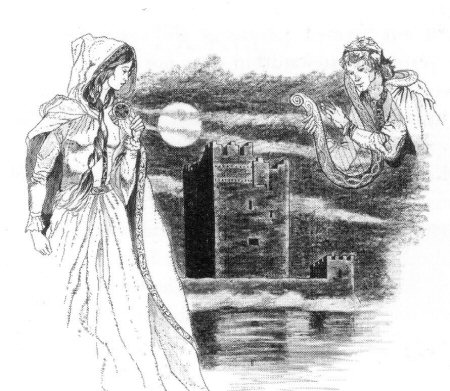Most of our more prominent ancient monuments have a folk story or two attached to them, and none more poignant than that associated with
You the reader will know from the history and description already told here (Narrow Water Castle) that this fortified site had many manifestations since the first arrival of the Normans on our shores in the twelfth century, though the present Keep (on the pattern of the fortified town-house) is said to date from the latter half of the sixteenth century (and is thus contemporaneous with Newry’s ‘Bagenal’s Castle’). When not in the possession of the English, this was the fortified dwelling of the local leader of the Magennis clan whose lands of Iveagh stretched in a long, wide strip of east Down up to Lough Neagh. At the time of our story the English were in possession though the rightful owner was Conn Magennis of Rinn.
Lassara was captured and kept imprisoned in the dungeon of the castle. At night alone there, she believed she could hear the harp strains from her musician lover through the wild crash of the waves outside.
The warden of the tower-house was making unwelcome advances towards her and threatening to put her to death unless she yielded to him. He gave her a limited period to concede willingly to him.
On the last night as the warden opened the dungeon door, Lassara dashed past him and made her way up to the top of the castle. She leapt from the battlements and as she dropped to the icy waters below, it is said that the music of the harper could be heard, drawing Lassara towards him. She perished in the place where the minstrel had died.
The news reached the Magennis camp and
‘And still – of a winter’s night, they say
When the wind is in the trees…….’
.and still on the shore you can hear it so plain..
His voice in the wind, singing soft this refrain…’
